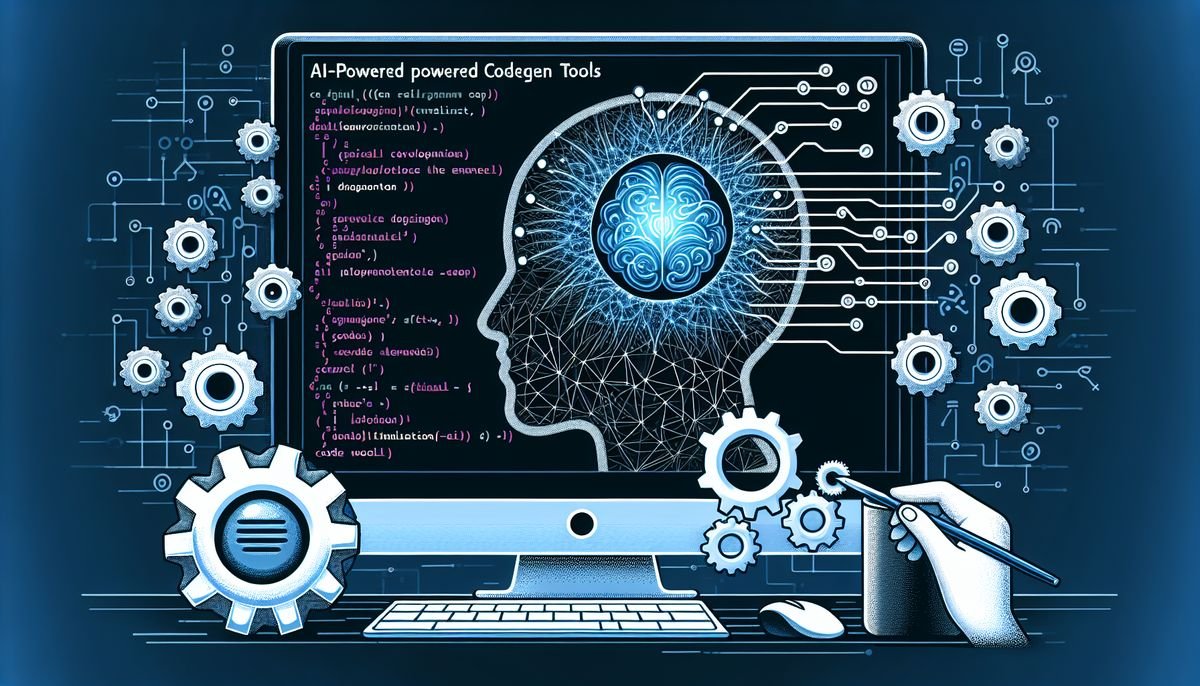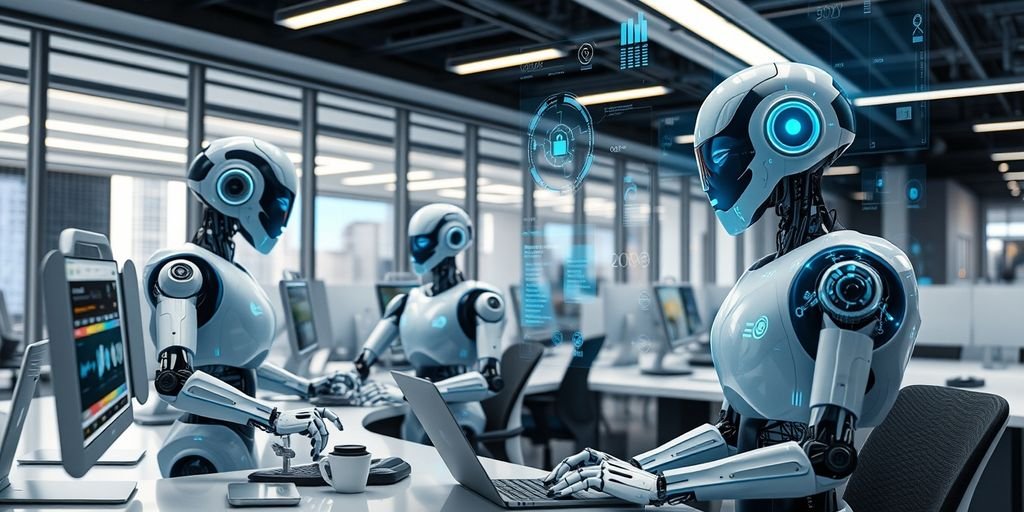The advent of AI-powered code generation tools is reshaping the landscape of software development. Among the most notable advancements is the emergence of Code Llama 70B, a tool designed to accelerate code production while maintaining high standards of quality. This article delves into the transformative effects of such tools on the software development process, particularly focusing on their integration into the Salesforce ecosystem through the introduction of Salesforce Einstein 1 Studio Tools. We’ll explore the key benefits and challenges these innovations present to developers and how they can adapt to harness the full potential of Generative AI (GenAI) in their workflows.
Key Takeaways
- AI-powered tools like Code Llama 70B are revolutionizing software development by providing capabilities such as automated code generation, which can significantly enhance productivity and innovation.
- Salesforce’s introduction of Einstein 1 Studio Tools marks a significant milestone for developers, offering an advanced GenAI platform to optimize and streamline the Salesforce development process.
- Developers need to adapt to the evolving landscape by acquiring new skills and understanding the principles of GenAI to remain competitive and leverage these technologies effectively within their organizations.
The Emergence of AI-Powered Code Generation Tools
Understanding the Capabilities of Code Llama 70B
The introduction of Meta’s Code Llama 70B has marked a significant milestone in the evolution of AI-powered code generation tools. With its ability to handle a staggering 500 billion tokens of code and code-related data, Code Llama 70B stands out for its large context window of 100,000 tokens, offering unprecedented depth in understanding and generating code.
The model’s specialization, particularly with Code Llama Python, is a testament to the industry’s shift towards more focused and efficient AI models. Trained on an additional 100 billion tokens of Python code, this version of Code Llama is tailored to deliver high-quality code generation for one of the most popular programming languages.
The emergence of specialized models like Code Llama Python indicates a future where AI tools are not just powerful, but also finely attuned to the specific needs of developers.
Meta’s approach to creating a suite of models with varying sizes—7 billion, 13 billion, and 34 billion parameters—ensures that developers of different scales can leverage the power of Code Llama 70B effectively. This flexibility is crucial as the DevOps community grapples with the rapid pace of development in generative AI and its implications for their skill sets.
The Impact of Generative AI on Software Development
The advent of generative AI has marked a new epoch in the realm of software development. Generative AI tools are reshaping the way developers approach coding, automating routine tasks and fostering a surge in productivity. These tools, equipped with advanced algorithms, can generate code snippets, debug existing code, and even suggest entire architectural solutions, thereby accelerating the development cycle.
One of the most talked-about benefits is the enhanced productivity that generative AI brings to the table. Developers are now able to offload the more mundane aspects of coding to AI, allowing them to concentrate on more complex and innovative work. This shift not only improves the speed of development but also the quality of the software produced.
The integration of generative AI into the software development process is not just a trend; it’s a transformative movement that is setting a new standard for efficiency and creativity.
The table below outlines some of the key ways in which generative AI boosts developer productivity, as highlighted by a recent IBM article:
| Benefit | Description |
|---|---|
| Code Generation | AI generates boilerplate code and complex algorithms. |
| Debugging | AI assists in identifying and fixing bugs quickly. |
| Architectural Design | AI proposes software architecture solutions. |
| Code Optimization | AI optimizes code for performance and maintainability. |
As developers adapt to this new landscape, the potential for innovation is boundless. Generative AI is not just a tool; it’s a partner in the creative process, offering insights and capabilities that were once the sole province of human expertise.
Navigating the New Landscape: Developers’ Adaptation to GenAI
As the development landscape transforms with the advent of Generative AI (GenAI), developers are finding themselves at a crossroads. The emergence of tools like Code Llama 70B has introduced a new era of efficiency, but not without concerns. A recent study revealed that nearly half of the developers fear their current skill sets may not suffice in the GenAI-dominated future.
The integration of GenAI into development practices is not just about adopting new tools; it’s about rethinking the entire approach to coding and problem-solving.
To stay relevant and thrive, developers are now focusing on enhancing their skills in areas where human intuition and creativity are irreplaceable. They are also learning to collaborate with AI, treating it as a partner that can handle routine coding tasks, leaving them free to tackle more complex challenges. This shift is evident in the Salesforce ecosystem with the introduction of Einstein 1 Studio Tools, marking a significant milestone for GenAI in development.
Understanding the implications of GenAI and adapting accordingly is crucial for developers. Here’s a list of key focus areas:
- Embracing continuous learning to keep up with GenAI advancements
- Developing an in-depth understanding of AI capabilities and limitations
- Fostering a mindset that views AI as a collaborative tool
- Staying informed about ethical considerations and best practices in AI use
Integrating Generative AI into Salesforce Development
Salesforce Einstein 1 Studio Tools: A New Frontier for Devs
The recent launch of Salesforce Einstein 1 Studio tools marks a significant milestone in the realm of generative AI for Salesforce developers. These tools, designed to integrate seamlessly with the Salesforce platform, offer a suite of low-code AI capabilities that are transforming the way developers approach app development, automation, and data management.
One of the most talked-about features is the Einstein Copilot, which serves as an AI assistant for coding, providing suggestions and automating repetitive tasks. This innovation is not just about efficiency; it’s about redefining the developer experience within the Salesforce ecosystem.
The Einstein 1 Studio tools are poised to enhance the security and trusted infrastructure of Salesforce, ensuring that developers can leverage AI with confidence.
Salesforce’s commitment to a low-code environment is evident in the Einstein 1 Platform Pricing, which aims to democratize AI tools, making them accessible to a broader range of developers. Here’s a quick look at the trending resources for Salesforce developers eager to dive into generative AI:
- Salesforce Developers Blog
- Get Started with Artificial Intelligence on Trailhead
- Einstein GPT Quick Look on Trailhead
- Responsible Creation of Artificial Intelligence on Trailhead
- Salesforce AI Research
The integration of generative AI into Salesforce is not just a fleeting trend; it’s a strategic move that promises to elevate the capabilities of developers and the applications they build.
The Role of Generative AI in Enhancing Salesforce Ecosystems
The integration of Generative AI into the Salesforce ecosystem is not just a fleeting trend but a transformative force reshaping the development landscape. Salesforce developers are now equipped with tools that enable rapid prototyping and innovation, crucial for staying ahead in a competitive market. For instance, generative models can streamline the UX design process, allowing for quick iterations and refinements based on user feedback.
In the context of Salesforce, the impact of generative AI extends beyond individual developers. It has a profound effect on end-users, job creation, and business outcomes. This is largely due to the pivotal role of cloud computing in facilitating the deployment and scaling of AI-powered solutions within the Salesforce platform.
The potential of generative AI for Salesforce developers is immense, offering a new frontier for creativity and efficiency in software development.
Understanding the potential of generative AI for Salesforce developers means recognizing its capacity to revolutionize the development workflow. Here are some key applications:
- Expedited development processes
- Enhanced ability to meet unique user and client needs
- Increased innovation through fast prototyping
As the Salesforce ecosystem continues to evolve, developers must prepare to harness the power of generative AI to remain competitive and deliver cutting-edge solutions.
Preparing Salesforce Developers for the GenAI Revolution
As the GenAI revolution unfolds, Salesforce developers are poised to harness the transformative power of Generative AI. This evolution in technology is not merely a fleeting trend; it represents a fundamental shift in how business applications are developed across various domains such as sales, customer service, marketing, and IT. The introduction of Generative AI and large language models (LLMs) is reshaping the landscape, enabling developers to create more sophisticated, responsive, and personalized applications.
To fully leverage the potential of Generative AI, Salesforce developers must acquaint themselves with the core principles and tools that are driving this change. One such framework that stands out is the Retrieval Augmented Generation (RAG), which allows the utilization of structured and unstructured data to enhance the development process. Understanding and mastering these tools will be crucial for developers to stay ahead in the competitive field of software development.
The key to thriving in the GenAI era is continuous learning and adaptation. Salesforce developers must embrace the new tools and methodologies to innovate and deliver exceptional value to their organizations.
Here are some steps to prepare for the GenAI revolution:
- Learn the fundamental principles of Generative AI.
- Explore the capabilities of tools like Salesforce Einstein 1 Studio and RAG.
- Engage with the Salesforce Trailblazer Community to share knowledge and experiences.
- Participate in workshops and training sessions focused on Generative AI applications.
- Experiment with pilot projects to gain hands-on experience with the new technology.
Conclusion
As we stand on the cusp of a new era in software development, the advent of AI-powered CodeGen tools like Meta’s Code Llama 70B and Salesforce’s Einstein 1 Studio Tools for GenAI Dev is undeniably transformative. These tools are not just about automating tasks; they are reshaping the development landscape by enabling developers to focus on creative problem-solving while leaving the repetitive coding tasks to AI. With capabilities ranging from code generation to personalized visual asset creation, the potential for increased efficiency and innovation is immense. However, it’s crucial for developers to adapt and upskill to remain relevant in this GenAI world. Embracing these advancements will not only revolutionize individual workflows but also propel the entire software industry forward, ensuring that the future of development is as dynamic and intelligent as the technology that drives it.
Frequently Asked Questions
What is AI-powered code generation and how does it impact software development?
AI-powered code generation tools, like Code Llama 70B, use machine learning algorithms to automatically generate functional code snippets, templates, or application scaffolding. This technology streamlines the software development process, potentially increasing efficiency and reducing the time required to write and debug code. For developers, it means adapting to new workflows that integrate AI assistance, which can enhance productivity but also require new skills and understanding of AI capabilities.
How can Salesforce developers benefit from Generative AI tools like Einstein 1 Studio?
Salesforce developers can leverage Generative AI tools such as Einstein 1 Studio to automate repetitive coding tasks, improve accuracy, and accelerate the development of Salesforce applications. These tools can provide intelligent code suggestions, automate the creation of visual assets, and personalize user experiences, thereby enhancing the overall Salesforce ecosystem and enabling developers to focus on more complex and creative tasks.
What are some challenges developers may face with the adoption of Generative AI in software development?
With the adoption of Generative AI, developers may face several challenges, including the need to learn new tools and adapt to AI-assisted workflows, concerns about job security as AI takes on more coding tasks, and ensuring the quality and reliability of the code generated by AI. Additionally, there may be ethical considerations regarding the use of AI-generated code and the potential for biases in the training data to be reflected in the output.



